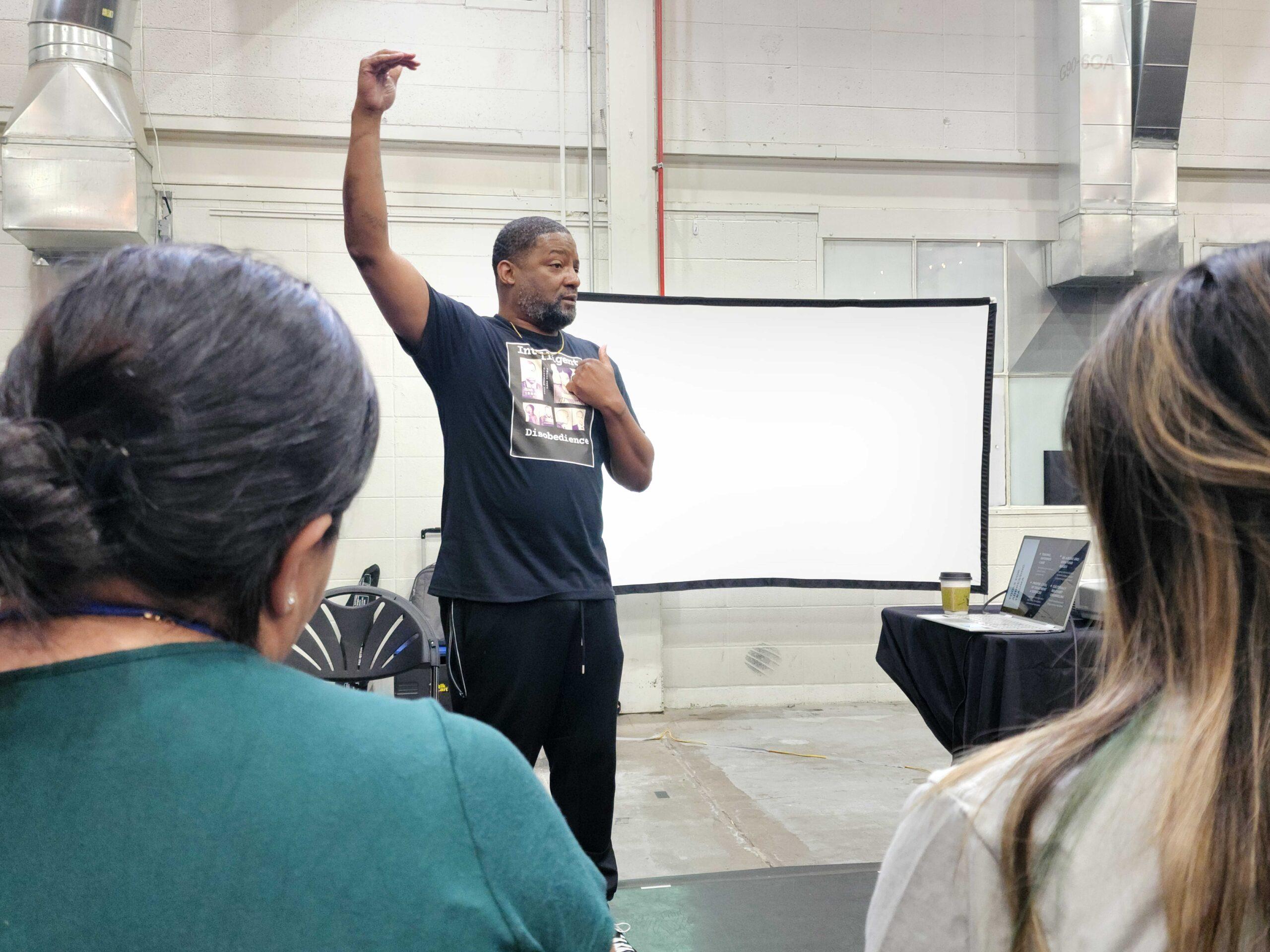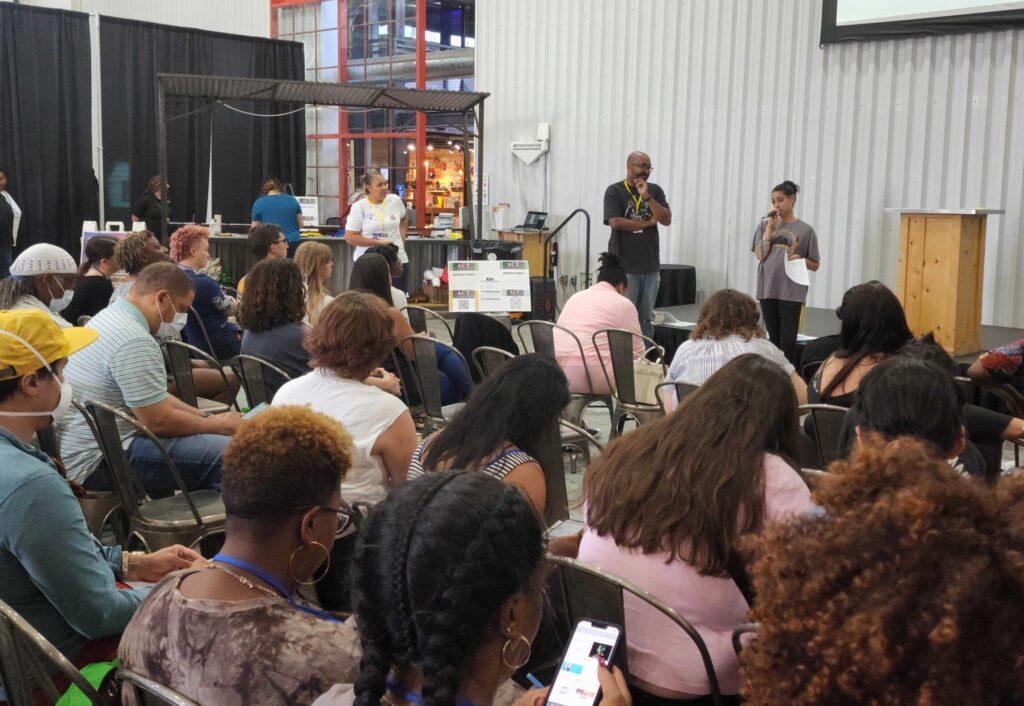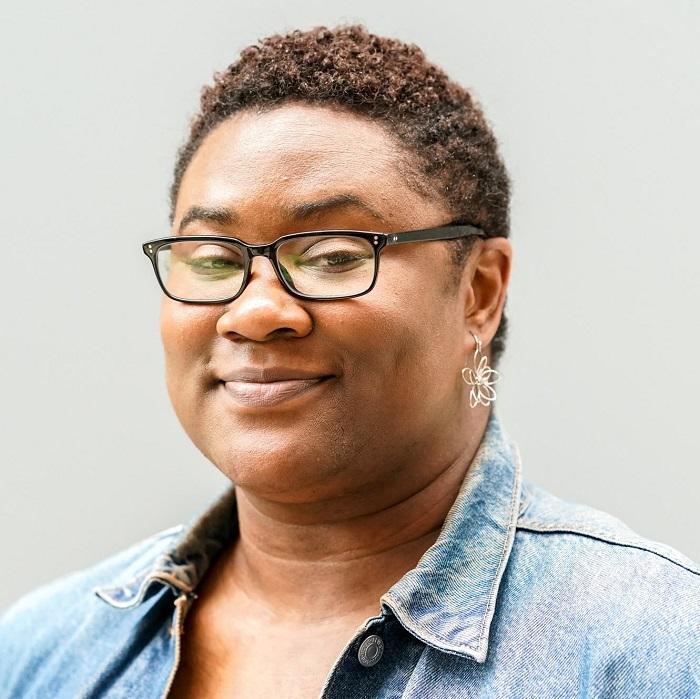
As instructed, about 50 people stood apart and spread out their arms horizontally. They were to hold their limbs in position while considering a question.
“When I say the term ‘white supremacy characteristics,’ what are some terms that come to mind?” asked Marc Morgan during a breakout session at a therapeutic community trauma session in Aurora on Wednesday.
“Paternalism,” one audience member said. “Perfectionism. Colonialism. Capitalism. Worship of the written word. Redlining. Disease spreading,” others added while their arms remained lifted.
“What’s happening with your arms?” Morgan asked the group after a minute or two had passed. “Aren’t they tired?”
The discomfort attendees felt while holding up their arms was meant to symbolize the pain experienced by communities of color as they continue to hold themselves up in a society that is built against them, according to Morgan. People shared that their arms were burning and that they were getting tired — exactly Morgan’s point.
The experience was part of a breakout session called “Got It From My Mama; How America was Built to Run on Our Collective Trauma” co-lead by Morgan, a program manager of Communities That Care and Renu Gupta, Sexual Violence Prevention Coordinator, both with the state health department.
More than 200 people gathered Wednesday at Stanley Marketplace in Aurora for the first of three “Active Collective Trauma (ACT)” summits. Individuals attended Wednesday’s gathering wearing colorful lanyards adorned with their nametag and a QR code for lunch.
Long, black curtains sectioned off the large space to provide privacy for several separate breakout rooms that focused on identifying collective trauma, mental health and healing.
“The purpose was identifying and addressing what active collective trauma is in a group setting for the first time ever,” said the summit’s co-coordinator Candice Bailey.
Bailey said she and LaToya Petty started talking about how to address systemic trauma in their community.
“Until we are willing to talk about, address, and really put into the environment the truth, we’re never going to get to where we believe we are,” she said, adding that it will require a lot of courage.
The summit is in Aurora with good reason. The community is struggling with a soaring crime rate and a police department investigated for discrimination issues.
A surge in violence among teens in the city significantly increased last year, believed to be connected to isolation, trauma and other factors stemming from the pandemic. This year, violent crime in Aurora jumped 30 percent from the first quarter of 2021.
Also, the state has charged more than a dozen cops with crimes for on-duty conduct since the “Police Integrity Transparency and Accountability Act,” or SB20-217, was passed in September 2020 after the death of George Floyd in Minneapolis.
Elijah McClain died in 2019 after Aurora police held him in a chokehold that has since been banned. The 23-year-old went into cardiac arrest after medical responders injected him with ketamine. McClain died a few days later. Three officers and two paramedics were recently indicted by a grand jury on charges of manslaughter and negligent homicide in what has been a high-profile case.
Aurora and the Colorado Attorney General last year passed a consent decree to resolve use of force and discrimination issues identified in a September 2021 report about the Aurora Police Department and Aurora Fire Rescue.
Wednesday’s trauma discussion was held at Stanley Marketplace intentionally, Bailey said. The building is between Denver’s largest residential neighborhood Central Park, formerly known as Stapleton, and downtown Aurora. She said while the marketplace’s purpose was originally to bring more jobs, diverse representation is lacking in its employees.
“There's a clear dividing line, even if you stand outside Stanley Marketplace, and you can look to the right and see the socioeconomic difference between where you are in Aurora, and then look to the left and see the socioeconomic differences in Denver because it literally sits on that border,” Bailey said. “The problem is that Stanley Marketplace is unintentionally welcoming to people who live on the north side, and not to the people who exist in the socioeconomic arena that does not get incorporated into the marketplace. They need to feel welcome.”

In addition to socioeconomic disparities, familial trauma was also addressed at the summit.
Gupta talked about being rejected by her Indian family, career equity struggles, internal pain that led to destructive methods of coping, and her journey of healing through therapy.
She said she decided to work on eradicating her inherited trauma by learning to speak of her feelings and get to the root of her pain.
Morgan and Gupta shared four tools for addressing trauma in any setting: ensuring there is trauma-informed care, having the proper level of treatment and services, being aware and owning your own biases, and having culturally relevant counseling.
“Health and safety is treated like a luxury in this country, like it’s a special privilege for you to live your life,” Gupta said. “A public health crisis is when the consequences have the potential to overwhelm a community's capability to address them. It affects a large number of people, it threatens health over the long term, and it requires formal large-scale system solutions.
Jonathan McMillan, founder of nonprofit consulting company Be Better Than Average, led a breakout group titled, “Traumatized – The American Black male experience”.
He played a 10-minute video that showed a clip from the 1977 television series “Roots,” and clips of deadly shootings by law enforcement in the U.S. including Tamir Rice, Philando Castile, Eric Garner, George Floyd, Ahmaud Arbery and others. The video also showed photos of 14-year-old Emmett Till and the aftermath of Dr. Martin Luther King Jr.’s death.
McMillan asked the group how they felt after watching the video. Some said they felt angry. Others felt extreme grief from seeing Black men repeatedly killed.
“Now imagine this is how you wake up feeling every day,” he said. “Physically and emotionally.” He also discussed different types of trauma and asked people to assess their own trauma levels by doing their own Adverse Childhood Experiences test.
Groups were led through breathing exercises to release any built-up emotion or tension after breakout sessions on Wednesday.
The next summit will take place July 27 and will focus on treating collective trauma and becoming resilient, Bailey said. The final session on August 31 will be about taking action and providing suggestions to state legislators from the Colorado Black Caucus.
Police will not be asked to help or participate in the ACT summits, Bailey said.
“The narrative that policing equals safety [is what] has been murdering us,” Bailey said. “It’s been a weapon of genocide against us. We made a conscious, collective decision, that we will not invite anyone into our space that is there to create harm or that is part of a system of oppression.”
Aurora PD’s interim police chief Daniel Oates acknowledged at a gathering earlier this month that the agency is in turmoil following the controversial ousting of former police chief Vanessa Wilson. His top priorities include stabilizing the department, building bridges in the community and ensuring the effective hiring of a new chief in six months.
Participating keynote speakers and panelists included Denver Public Health; the Latino Coalition for Community Leadership; the Colorado Criminal Justice Reform Coalition; Colorado Department of Public Health and Environment; and the Righteous Rage Institute.








